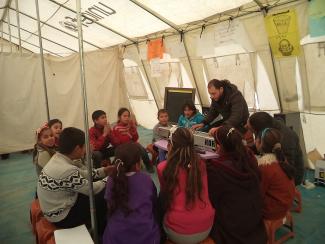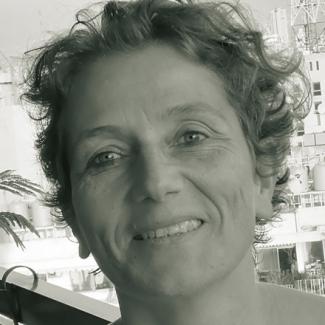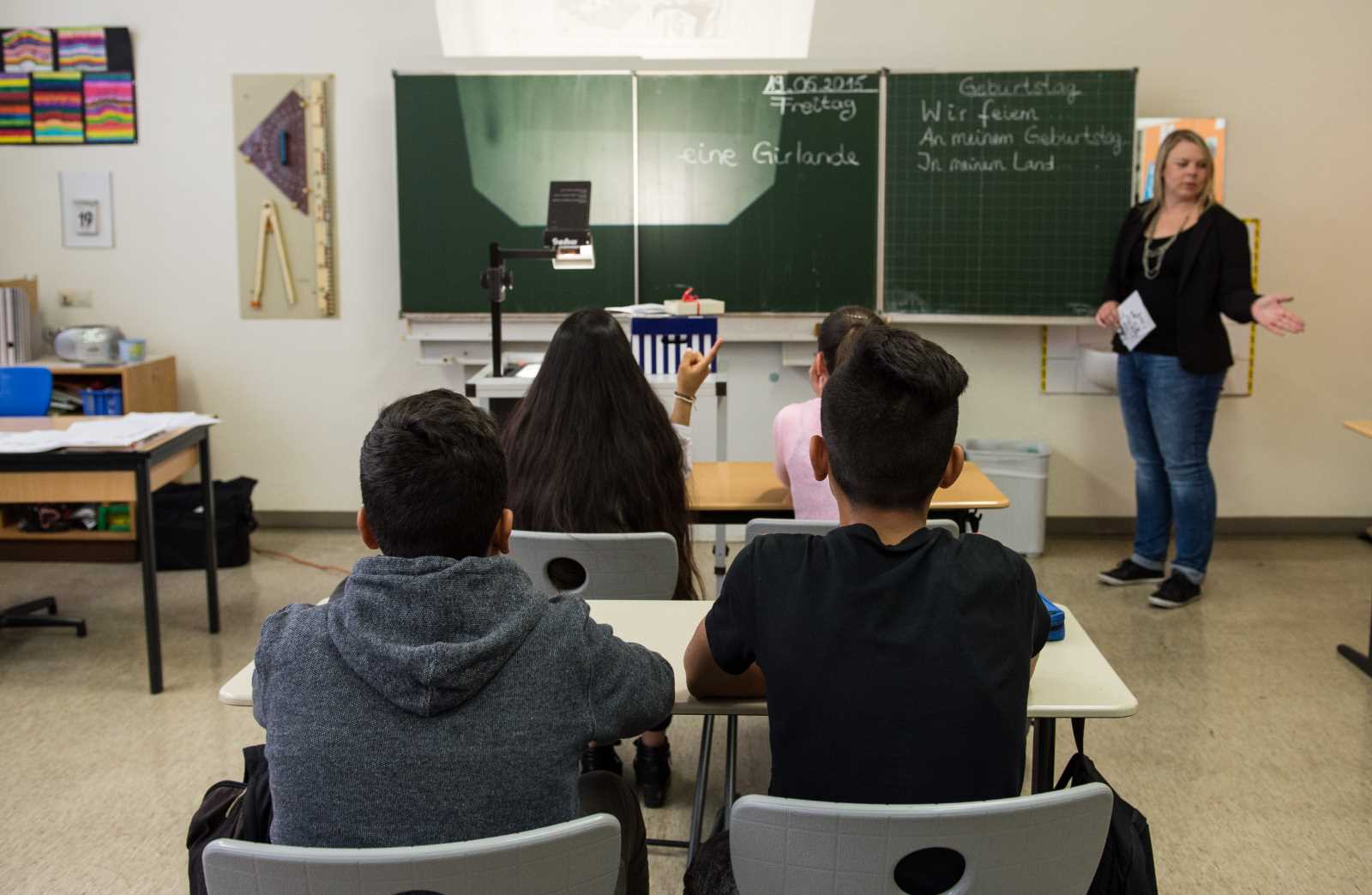Refugees
Education crisis

Shaima is more than happy: The nine-year-old can at last go to school again. In Syria, before their flight, the girl with the long brown ponytail was attending second grade. In the past school year, she couldn’t study at all, because there was no school in the refugee camp in Lebanon where she is now living with her parents.
Last summer, however, the non-governmental organisation Beyond started a school in her camp on behalf of UNICEF. The construction consists of four classrooms. They are built with simple means, as are the shelters of the people in the camp: basic wooden scaffolds covered with blue plastic sheets. In each class, there are about 25 children. The classes are not divided by grades, but by age; so Shaima attends class nine to 11. The syllabus, which was drafted by Beyond and UNICEF in cooperation, is a mix of the Lebanese and the Syrian curriculum, says Khalif Al-Mislat, the school’s director.
His school caters to the needs of children who – like Shaima – were not able to attend school for a while. The children are taught Arabic and English, biology, mathematics and social sciences. The idea is to enable the pupils to cope with the Syrian curriculum, should they return home, or move on to a public school in Lebanon, should they stay.
Ahmad Al-Hammoud is an English and music teacher. School should not only impart knowledge, he says, but also offer the children space for play and personal development. The families’ life is cramped in the camps, marked by stress, grief due to the loss of loved ones in the war and financial worries. In school, the children escape the depressing atmosphere for a few hours.
Overloaded system
The war in Syria has displaced millions of people. Many have sought shelter in the neighbouring countries Jordan, Iraq, Turkey and Lebanon. In the course of the past three years, Lebanon has given shelter to approximately one million Syrians. The real number is probably higher. Not all refugees are registered by the UNHCR.
The Cedar state is bearing the brunt of Syrian refugees. Today, every fourth inhabitant hails from the neighbouring country. The capacities of Lebanon, a chronically instable state, are clearly overburdened. The pressure on the labour market is difficult to manage. The same is true of water and power supply.
In contrast to Jordan or Turkey, the refugees in Lebanon do not live in camps run by UNHCR or government agencies. Instead, the displaced persons live all over the country. They rent flats, find accommodation in garages or build huts, like in the camp where Shaima lives.
Half of all Syrian refugees in Lebanon are children, according to Dana Sleiman of the UNHCR: “There are 300,000 kids aged between five and 17 years, and they all need education.” Lebanon is unable to rise to this huge challenge on its own.
The schools that Beyond has started on behalf of UNICEF in Lebanon offer non-formal schooling for displaced children from Syria. Maria Assi of Beyond estimates that there are 460 camps in the Bekaa valley and the north of Lebanon. Most refugees have settled in rural areas near the Syrian border. Only few of the children who live there have the opportunity to attend a school. Assi says: “If UNICEF had more money, it could offer more schooling.”
Solidarity with school children
Organisations of exiled Syrians try to give their young compatriots access to education. One example is Alphabet, a non-governmental initiative founded by Ranim Sheikh Ibrahim. She is a pharmacist from Damascus, and collects donations from her friends and family for educational purposes. In six refugee camps, Sheikh Ibrahim was able to finance small schools this way. She relies on Syrian teachers who live in the camps themselves.
With her recently founded organisation Allemni (the word means “teach me”), Dina Yaziji Haddad is fighting child labour among Syrians in Lebanon. Allemni offers parents financial support. In turn, they have to commit to sending their children to school instead of making them work. Yaziji Haddad, who has lived in Canada for many years, cooperates with Syrian organisations in Lebanon, which help
parents and children on the ground.
Kevin Watkins, the director of the London-based Overseas Development Institute, has visited Lebanon on behalf of the UN Special Envoy for Education. The result is a report on the state of education of Syrian refugee children. The expert points out that the world is not doing enough for the schooling of these kids and should be supporting the Lebanese government in related efforts. Watkins compares the school enrolment rates amongst Syrian displaced children to global figures and concludes that, if the Syrian refugee population were considered a country, that country would have the world’s lowest school enrolment rate.
The UNHCR states in a report it published in November 2013 that 80 % of the Syrian children in Lebanon are not going to school. The reasons are manifold:
- long ways to school,
- differences in Syrian and Lebanese curricula,
- financial distress of the families,
- wide-spread child labour and
- mobbing at the Lebanon’s public schools.
- The most important reason, however, is simply the lack of education opportunities for Syrian children.
In 2012, Lebanon’s Ministry of Education allowed Syrian children to go to public schools. As a result, 40,000 kids started attending classes again regularly, free of costs. This measure, however, exhausted the country’s capacities. The Ministry of Education could not spend more money on Syrian pupils. Thanks to UNHCR funding, a second shift has been introduced at some public schools, so another 30,000 children were accommodated. The second shift was proposed by Kevin Watkins.
One example for the initiative taken by the Lebanese government is the school Hosh Al-Umara in Zahle, a mid-sized town in Bekaa in eastern Lebanon. In the morning, more than half of the students are Syrians. Since January, the school has also been offering an afternoon shift. Classes are now held according to the Lebanese curriculum from to two to six. 365 kids and teenagers attend grades 1 to 9.
The demand is so strong that there is the need of another school in Zahle, says school director Jhonny Abu Touma. “Our school is the biggest in the area, but we cannot absorb more children.” The children have quite diverse family backgrounds. Abu Touma says: “Some are very poor. The other day, I noticed a child without socks, wearing shoes that were way too big. Another child is driven to school by the father in a Mercedes. Some bring croissants to school. Others cannot even afford a sandwich.”
Displacement means that school attendance is interrupted. As a result, there are huge gaps in the knowledge of many children. The director reports that some younger children have forgotten letters which they had already learned in Syria. Non-formal education contributes to closing such gaps, the experienced educator argues.
Kevin Watkins criticises the international community. He says the presence of Syrians in Lebanon was regarded as a short-term refugee problem for too long. He demands an international three-year-plan for education which ought to fund the expansion of all education options – from classes in regular public schools, to non-formal education. He wants new facilities to be built and additional teacher to be hired. In particular, Syrian teachers who live in Lebanon, should be recruited, Watkins says.
For 2014, the UNHCR has estimated that the costs for sending all Syrian children in Lebanon to school would amount to $ 53.4 million. Up to now, the UNHCR has received around 30 % of this sum. The majority of Syrian children in Lebanon will thus not get a chance to attend a school this year. For Shaima and her classmates, the tuition for this school year is secured. Whether classes will continue next year, is an open question.
Mona Naggar is a journalist and journalism trainer. She lives in Beirut, Lebanon. mona.naggar@googlemail.com











